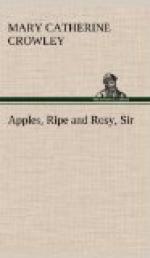“Wisha, this is goin’ to be a wild night, I’m thinkin’!” sighed she, wrapping a faded and much-worn “broshay” shawl more securely about her, and striving to protect both herself and her wares beneath the shelter of a dilapidated umbrella, one of the ribs of which had parted company with the cotton covering,—escaped from its moorings, as it were, and stood out independently. “Glory be to God, but what bad luck I’ve had the day!” she continued under her breath, from habit still scanning the faces of the passers-by, though she had now faint hope that any would pause to purchase. “An’ it’s a bigger lot than usual I laid in, too. The peanuts is extry size; an’ them Baldwins look so fine and rosy, I thought it ud make anybody’s mouth water to see them. I counted upon the schoolb’ys to buy them up in a twinklin’, by reason of me markin’ them down to two for a cent. An’ so they would, but they’re so taken up with sportin’ in the snow that they can think of nothin’ else. An’ now that it’s turned so raw, sure I’m afraid it’s cold comfort any one but a lad would think it, settin’ his teeth on edge tryin’ to eat them. I’ll tarry a bit longer; an’ then, if no better fortune comes, I’ll take meself to me little room, even though I’ll have to drink me tea without a tint of milk or a dust of sugar the night, and be thankful for that same.”
Patiently she waited. The clock struck five. As no other customers appeared, the old woman, who was known as Widow Barry, concluded that she would be moving. “Though it is too bad,” she murmured; “an’ this the best stand anywhere hereabouts.”
In reality, the stand consisted of a large basket, a camp-seat, the tiresome privilege of leaning against two feet of stone-wall, and the aforesaid umbrella, which was intended to afford, not only a roof, but an air of dignity to the concern, and was therefore always open, rain or shine.
To “shut up shop,” though it meant simply to lower the umbrella, gather up the goods and depart, was to the apple-vender a momentous affair. Every merchant who attempts, as the saying is, to carry his establishment, finds it no easy task; yet this is what the widow was obliged literally to do. To make her way, thus laden, in the midst of a driving snowstorm was indeed a difficult matter. Half a dozen times she faltered in discouragement. The street led over a steep hill; how was she to reach the top? She struggled along; the wind blew through her thin garments and drove her back; the umbrella bobbed wildly about; her hands grew numb; now the basket, again the camp-seat, kept slipping from her grasp. Several persons passed, but no one seemed to think of stopping to assist her. A party of well-dressed boys were coasting down the middle of the street; what cared they for the storm? Several, who were standing awaiting their turn, glanced idly at the grotesque figure.
“What a guy!” cried Ed Brown, with a laugh, sending a well-aimed snowball straight against the umbrella, which it shook with a thud. He was on the point of following up with another.




